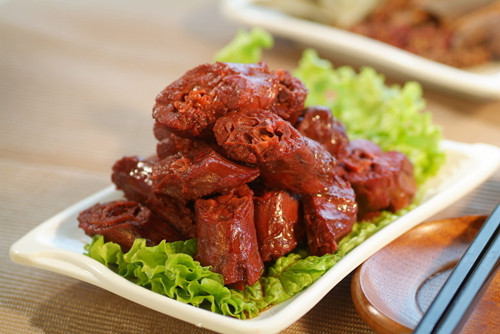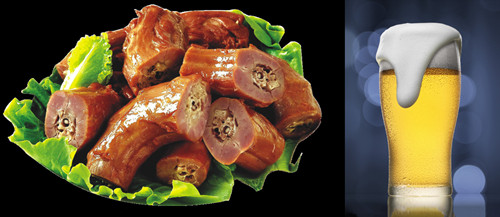Duck Necks
- Source: Hubei Provincial People's Government
- 10/18/2022 17:04
- 0 868

Jingwuyabo (Jingnwu Duck Necks), a food chain famous for duck necks, gets its name from the well-known Jingwu Road in Wuhan. The spicy food has been well received in other parts of China.

Spicy duck necks and beer is a perfect match. The salty and spicy duck neck compliments ice-cold beer and is the perfect snack for football fans watching the late night games.
Pot-stewed duck necks originate from Wuhan, capital of Central China’s Hubei Province. There are many stories about the dish’s origins. The most widespread says a local man named Tang Lajiu created it on Jingwu Road in 1993. Vendors usually discarded the duck necks back then. Tang and his brother took inspiration from Sichuan’s spicy cuisine and stewed them with herbs and spices.
In 2002, the film Life Show, centered on a Wuhan woman who earns her living selling spicy duck necks, lifted the dish to national acclaim. Visitors to the city started flocking to Jingwu en masse to try its famous duck necks.
Wuhan’s Jingwu Road was demolished for a multifunctional residential community along with its signature rows of spicy duck neck stores in 2011. The street is no more, but its name remains on the signature delicacy that became a nationally celebrated dish. After the demolition, Jingwu Road’s duck neck shops were relocated to a street about 300 meters away.
Duck neck is usually served as a snack, rather than a dish on the table. Most consumers gnaw the duck necks when having parties or watching TV.
Duck neck chain stores such as Jingwuyabo, Zhouheiya, Jiu Jiu Ya, etc. are building their fame all over China. About 125 million duck necks are sold every year in Hubei - lined up, they’d stretch about halfway around the planet - according to the Jingwu Duck Neck Association, which was founded in 2007.